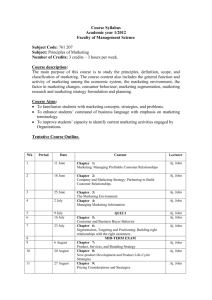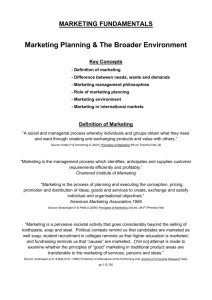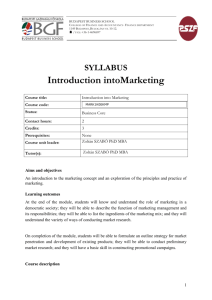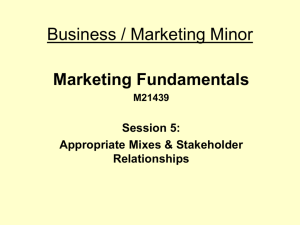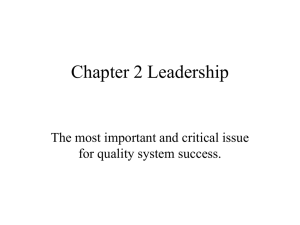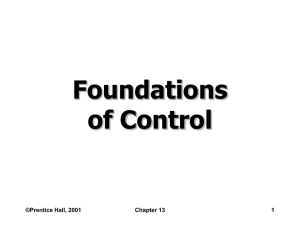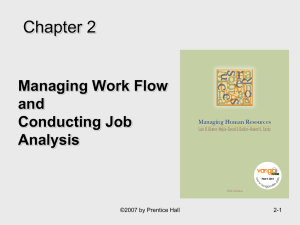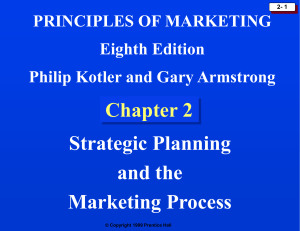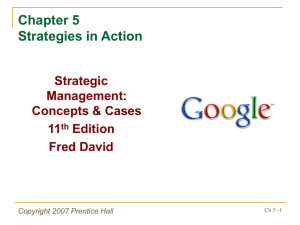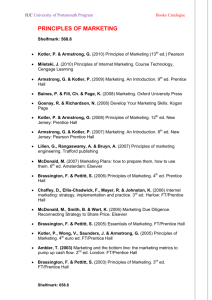Marketing
advertisement
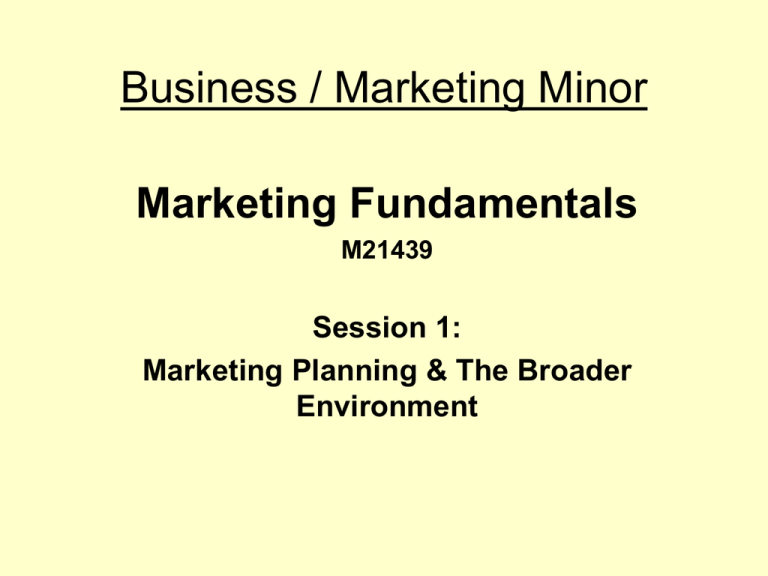
Business / Marketing Minor Marketing Fundamentals M21439 Session 1: Marketing Planning & The Broader Environment Key Concepts • Definition of marketing • Difference between needs, wants and demands • Marketing management philosophies • Role of marketing planning • Marketing environment • Marketing in international markets Definition of Marketing “A social and managerial process whereby individuals and groups obtain what they need and want through creating and exchanging products and value with others.” Source: Kotler,P & Armstrong,G (2001) Principles of Marketing 9th ed, Prentice Hall, p6 Definitions of Marketing “Marketing is the management process which identifies, anticipates and supplies customer requirements efficiently and profitably.” Chartered Institute of Marketing “Marketing is the process of planning and executing the conception, pricing, promotion and distribution of ideas, goods and services to create, exchange and satisfy individual and organisational objectives.” American Marketing Association,1985 Source: Brassington,F.& Pettit,S.(2000) Principles of Marketing 2nd ed, UK:FT/Prentice Hall Definition of Marketing “Marketing is a pervasive societal activity that goes considerably beyond the selling of toothpaste, soap and steel. Political contests remind us that candidates are marketed as well soap; student recruitment in colleges reminds us that higher education is marketed; and fundraising reminds us that “causes” are marketed…[Yet no] attempt is made to examine whether the principles of “good” marketing in traditional product areas are transferable to the marketing of services, persons and ideas.” Source: Andreasen,A.R. & Belk,R.W. (1980) Predictors of Attendance at the Performing Arts Journal of Consumer Research Sept, pp.112-120 Core Marketing Concepts Needs, wants and demands Markets Exchange, transaction and relationships Products and services Value, satisfaction and quality Source: Kotler,P & Armstrong,G (2000) Principles of Marketing 9th ed, USA:Prentice Hall Need, Want, Demand • Need = A state of felt deprivation • Want = The form taken by a human need as shaped by culture and individual personality • Demands = Human wants that are backed by buying power Source: Kotler,P & Armstrong,G (2001) Principles of Marketing 9th ed, Prentice Hall, p7 Question: When does a want become a need? For example, why do people say “I need to have the latest DVD/clothing/gossip” ? Values “All customers have values made up of attitudes and beliefs that affect their perceptions and buying behaviour. Beliefs can also be thought of as knowledge, opinion or faith depending whether they can be verified by personal experience or research.” Source: Bickerton,P, Bickerton,M & Pardesi,U (2000) Cybermarketing 2nd ed, Butterworth Heinemann, p7 Supply & Demand Supply: The amount of a product producers are willing to provide at a particular price. Demand: The amount of a product customers are willing to purchase at a particular price. Source: Keegan,W.J., Moriarty,S.E. & Duncan,T.R. (1995) Marketing 2nd ed, Prentice Hall, p11 Product “Anything that can be offered to a market for attention, acquisition, use, or consumption that might satisfy a want or need. It includes physical objects, services, persons, places, organisations and ideas.” Source: Kotler,P & Armstrong,G (2001) Principles of Marketing 9th ed, Prentice Hall, p7 Definition of Service “Time and expertise provided or activities performed in the customer’s behalf by an individual or firm.” Source: Keegan,W.J., Moriarty,S.E. & Duncan,T.R. (1995) Marketing 2nd ed, Prentice Hall, p10 E.g. of Goods/Services Spectrum PURCHASE A CAR GOODS TELEVISION RENTAL FAST FOOD OUTLET GOURMET RESTAU – RANT HAIRCUT LEGAL ADVICE SERVICES Question: Why don’t people consider going to McDonalds for a romantic meal? Definition of Profit “The return that a company receives on a transaction after costs have been subtracted.” Source: Keegan,W.J., Moriarty,S.E. & Duncan,T.R. (1995) Marketing 2nd ed, Prentice Hall, p10 Definition of Publics “Publics are any organisations or individuals that have actual or potential influence on the marketing organisation…(these can) include government departments, competitors, outside pressure groups, employees, the local community and so forth.” Source: Blythe,J (2001) Essentials of Marketing 2nd ed, Prentice Hall, p9 Definition of Markets “Markets are all the actual and potential buyers of the firm’s products.” Source: Blythe,J (2001) Essentials of Marketing 2nd ed, Prentice Hall, p9 Marketing Management Philosophies There are 5 alternative concepts under which organisations conduct their marketing activities: 1. Production 2. Product 3. Selling 4. Marketing 5. Societal Marketing Source: Kotler,P. & Armstrong,G.(2001) Principles of Marketing 9th ed,USA:Prentice Hall Management Philosophies Orientation Focus Characteristics & aims Eavesdropping Production Manu -Increase production -Cost reduction & control -Make profit through volume Product Goods -Quality is all that matters -Improve quality levels -Make profit though volume Main Era (generalised) USA West Europe East Europe “Any colour you want – as long as it’s black” Up to 1940’s Up to 1950’s Late 1980’s “Just look at the quality of the paintwork” Up to 1940’s Up to 1960’s Largely omitted Source: Brassington,F.& Pettit,S.(2000) Principles of Marketing 2nd ed, UK:FT/Prentice Hall Management Philosophies Orientation Focus Characteristics & aims Eavesdropping Main Era (generalised) USA West Europe East Europe Selling Selling what’s produced – seller’s need -Aggressive sales & promotion -Profit through quick turnover of high volume “You’re not keen about black? What if I throw in a free sun roof” 1940 – 1950’s 1950 – 1960’s Early 1990’s Marketing Defining what customers want – buyer’s need -Integrated marketing -Defining needs in advance of production -Profit through customer satisfaction & loyalty “Let’s find out if they want it in black, and if they would pay a bit more for it” 1960’s onward 1970’s onward Mid 1990’s onward Source: Brassington,F.& Pettit,S.(2000) Principles of Marketing 2nd ed, UK:FT/Prentice Hall Question: Now you understand the basic marketing concepts do you think that organisations need to plan their marketing activities? Marketing’s Role in Strategic Planning Marketing plays a key role in an organisation’s strategic planning process: 1. Provides a guiding philosophy – the marketing concept – that suggests that organisation strategy should resolve around serving the needs of important consumer groups Source: Kotler,P. & Armstrong,G.(2001) Principles of Marketing 9th ed,USA:Prentice Hall Marketing’s Role in Strategic Planning 2. Marketing provides inputs to strategic planners by helping to identify attractive market opportunities and by assessing the firm’s potential to take advantage of them. 3. Within business units, marketing designs strategies for reaching the unit’s objectives. Once the objectives are set, marketing’s task is to carry them out profitably. Source: Kotler,P. & Armstrong,G.(2001) Principles of Marketing 9th ed,USA:Prentice Hall UK consumer expenditure Source: Marketing Pocket Book, 1999 Reprinted by permission of NTC Publications, Ltd. Source: Dibb,S, Simkin, Pride, Ferrell (2001) Marketing: Concepts & Strategies 4th ed, USA:Houghton Mifflin The forces of the marketing environment: macro and micro Source: Dibb,S, Simkin, Pride, Ferrell (2001) Marketing: Concepts & Strategies 4th ed, USA:Houghton Mifflin Levels of involvement in international marketing Source: Dibb,S, Simkin, Pride, Ferrell (2001) Marketing: Concepts & Strategies 4th ed, USA:Houghton Mifflin
